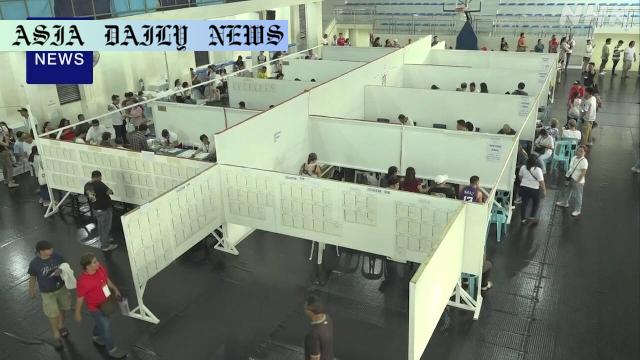Philippine Midterms: Ballot counting begins amid a tense standoff between President Marcos Jr. and Vice President Sara Duterte.
- Key Point 1: Philippine midterms feature Senate races crucial for upcoming impeachment trial of Vice President Sara Duterte.
- Key Point 2: Political clash arises between President Marcos Jr. and Vice President Duterte over their conflicting foreign policy and leadership visions.
- Key Point 3: Local elections highlight national tensions as voters cast ballots mid-way through Marcos’ presidency.

Introduction: A Nation At Political Crossroads
The Philippines has recently concluded its pivotal midterm elections, a critical moment not only for determining legislative power but also for shaping the nation’s political landscape during the presidency of Ferdinand Marcos Jr. At the heart of the elections is a fiery political standoff between President Marcos and Vice President Sara Duterte. This rift, occurring halfway through Marcos’ six-year term, has shaped both national and local races, drawing attention from across the globe. With half of the Senate seats, all House of Representatives seats, and various local offices up for grabs, the stakes—political, legal, and diplomatic—could not be higher.
The Fallout Between Marcos and Duterte
Once aligned as running mates during the 2022 presidential election, relations between President Marcos Jr. and Vice President Sara Duterte have soured dramatically. One major point of contention revolves around the incarceration of former President Rodrigo Duterte—Sara’s father—by order of the International Criminal Court. Initially, Marcos had taken a stance refusing to support the ICC’s actions but later reversed course, enraging Vice President Duterte. Adding fuel to this clash is the ideological divergence regarding foreign policy, particularly on relations with China and the United States. While the Duterte administration was marked by a pro-China tilt, Marcos has adopted a closer alignment with the U.S., granting increased military access to American forces.
Impeachment Looming—The Role of Senate Races
The Senate races in this election hold special significance, as the chamber is anticipated to conduct the impeachment trial of Vice President Duterte in early July. In February, the Lower House impeached Duterte on charges alleging misuse of public funds—a conviction that could bar her from seeking the presidency in 2028. The political drama doesn’t end there: Sara Duterte’s support for Senate hopefuls linked to her father’s administration has led to varying levels of success, given many of these candidates’ strained reputations and their unpopular pro-China stances. Observers say the performance of her backed candidates in the Senate could significantly influence her impeachment trial outcomes.
The Bigger Context: Governance and International Relations
The midterms come at an inflection point for the Philippines’ governance priorities. Marcos’ administration has focused on recalibrating diplomatic relationships, most notably pivoting away from Duterte-era China-friendly policies toward a more U.S.-centric stance. This shift has implications not just for the South China Sea territorial disputes but also for broader geopolitical dynamics in Asia. Domestically, the midterms also provide an opportunity to weigh the administration’s progress and challenges. Voters expressed divergent reactions to issues ranging from economic recovery post-pandemic to existing governance quality at various local levels of government.
Conclusion: What Lies Ahead for the Philippines
For the Philippines, this midterm election represents more than just a reshuffling of seats; it’s a referendum on the leadership and division between President Marcos Jr. and Vice President Duterte. The political outcomes, especially in Senate composition, will shape the legislative support for Marcos’ policies and Duterte’s impeachment proceedings. On a broader level, the results may influence the nation’s alignment on critical international matters and set the stage for the next chapters of political developments. As ballot counting and analysis continue, the political drama unfolding in the Philippines underscores the complexity of its governance and democratic processes.



Commentary
The Complex Dynamics of Philippine Politics
The Philippine midterms lay bare the intricate and often personal dynamics of the nation’s political scene. While elections are typically about policies and platforms, the clash between President Marcos Jr. and Vice President Sara Duterte highlights how political rivalries can shape the trajectory of governance. This feud underscores deeper tensions in political loyalty and strategy, with wide-reaching implications, especially in relation to impeachment proceedings and foreign policy. It also reflects the larger challenges of maintaining alliances while navigating personal ambitions and historical contexts in leadership.
Geopolitics and Local Realities
One of the most fascinating aspects of these elections is how global power struggles are influencing domestic politics. The shift in the administration’s foreign policy—from the pro-China inclinations of Duterte Sr. to an increasingly U.S.-aligned stance with Marcos—underscores the interconnectedness of local governance and international relations. Yet, the local elections reveal that while voters may lean one way on foreign alliances, they remain deeply concerned with tangible, everyday issues such as resource allocation, corruption, and regional representation in the government.
A Referendum on Leadership
This midterm election feels very much like a referendum not just on the Marcos administration but also on the legacy of Sara Duterte’s last name. While the vice president faces personal and political crises, these elections serve as a litmus test for her father’s allies and their ideologies. The results could pave the way for reshaping alliances ahead of the next presidential run, setting the tone for whether personalities or policies dominate the Philippine political stage moving forward. It’s a riveting time in the country’s democracy, a testament to its resilience despite significant challenges.